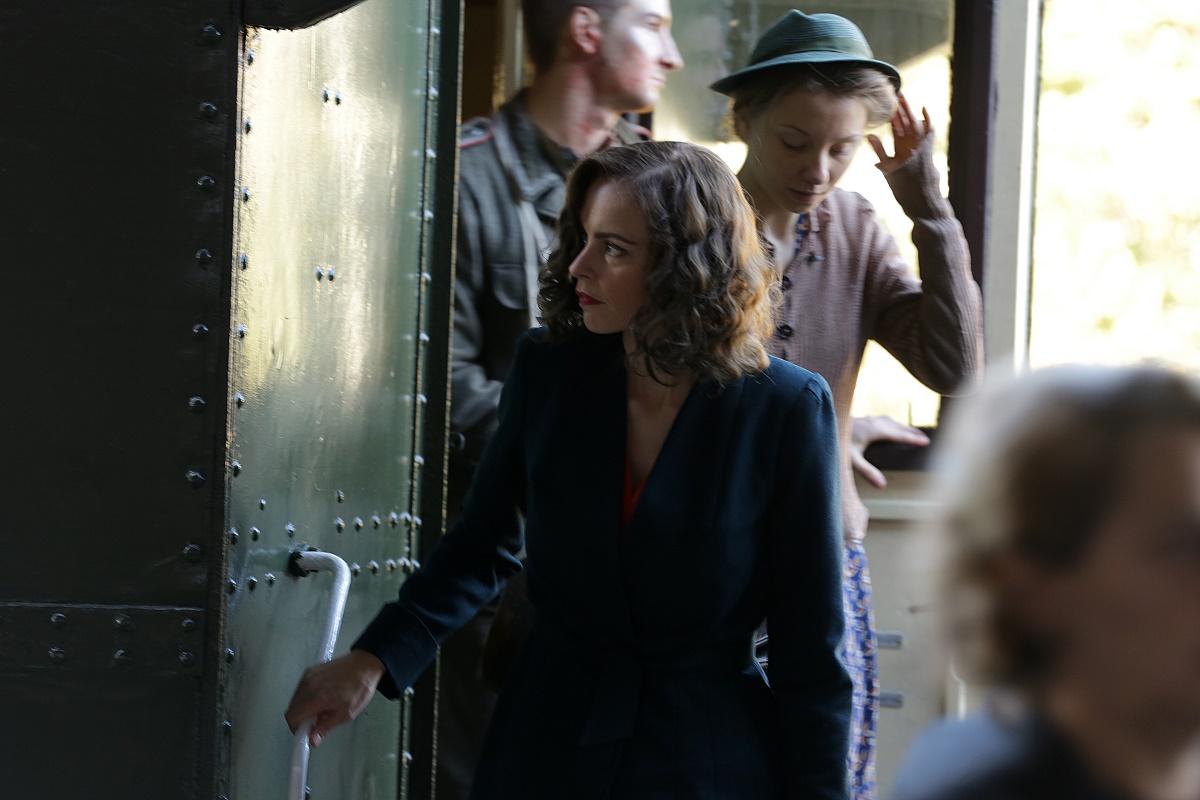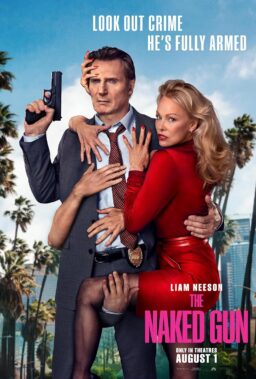Christian
Petzold’s brilliant and fascinating new Holocaust drama “Phoenix” marks his
sixth collaboration with the superb actress Nina Hoss. She plays the Auschwitz
survivor Nelly, a Jewish singer who endured unspeakable emotional and physical
terror. Repatriated to a ruined postwar Berlin, her face badly disfigured by
complications of a bullet wound, Nelly is given the chance at a new identity
following her facial reconstruction.
“I want to
look like I used to,” she demands. As incarnated by Hoss with a soulful
intensity, Nelly is a solitary figure whose desire to reclaim her past makes
possible the movie’s eerie mad scientist-inflected scenario. A gifted chanteuse
who evaded the Gestapo until late in the war, Nelly has discovered her entire
family was liquidated in the death camps. The story kicks in after Nelly is
reunited with her husband, the cold opportunist Johnny (Ronald Zehrfeld, who
played opposite Hoss in Petzold’s excellent 2012 “Barbara”).
A German
pianist turned small-time operator at the eponymous nightclub in the American
sector, Johnny does not recognize Nelly as his wife though believes she is a
passable double. He convinces Nelly to appropriate the identity of the falsely
assumed dead woman in order to claim her inheritance. He conditions her to
essentially inhabit her own skin, fastidiously instructing her on how to walk,
talk and even write her name.
The movie
is freely adapted from a novel by French writer Hubert Monteilhet that
previously served as the basis of the 1965 J. Lee Thompson thriller, “Return
from the Ashes.” Steeped in Greek tragedy, the movie is also a fever dream that
riffs on Alfred Hitchcock’s “Vertigo” and Georges Franju’s “Eyes Without a
Face.” The psychological tension turns on whether Nelly is a traumatized dupe whose
obsessive, unquestioned love for Johnny underlines a deeper pathology or a
free-thinker whose complicity in the plot is a chance for her to uncover the
details of her husband’s actions leading to her arrest.
The film
has generated rapturous critical praise and highly promising early audience
response that suggests a long-overdue breakout for the German filmmaking team.
On the eve of the film’s national expansion, I spoke to Petzold and Hoss
separately. I have woven together the two strands for the following
conversation.
One of the fascinating qualities of
“Phoenix” is how it functions as a corollary or continuation of your previous
film, “Barbara,” not just because of the same two lead actors, but how both
films meditate on history and memory.
Christian Petzold: Ten years ago I told [filmmaker and
screenwriter] Harun Farocki, “I never want to make a period film. I hate it. I
hate costumes. I hate stagecoaches.” I want to make movies about our times. He
gave me a quotation about [theoretical sociologist Theodor] Adorno, who said:
“It’s not a question of what the old times will say to us. It’s a question of
what we can say to the old times.” We started working on two period pictures.
When Harun and I were sitting at the editing table and I showed him the final
cut of “Barbara,” he said: “First we had the love couple, and now you can show
the destruction of the love, and you have to use the same actors.”
Nina Hoss: I always have the feeling with
Christian that his movies are really about German identity, or about
individuals in search of their own identity. Someone like Barbara, she makes up
her mind of who she is and what she stands for and what she is not going to go
along with, and that makes her who she is and what she becomes. Within the
social environment, you watch how that forms a personality or an individual.
It’s the same with “Phoenix.” These characters are in situations they have to
go through or experience things. As they begin to understand more about life,
of who they want to be or what their strengths are, everything they hold up
becomes a mirror. You don’t want to be the picture that they want to see.
I was very interested in your
friendship with Harun Farocki. He was a great filmmaker, but he made these
almost unclassifiable essay films, like “How to Live in the Federal Republic of
Germany,” that were so different from your films. I was very curious about your
friendship and your working methods.
Christian Petzold: He was the editor of a film
magazine called Filmkritik—like Rolling Stone for the movies. His name
was always attached to the best articles. And then we met at a football
[soccer] match. In our work together, everybody thought that Harun was the
cold-blooded intellectual and I was the warm-blooded, emotional guy. It was totally
the other way around. I’m the constructor in the stories, and Harun was always
on the side of emotion. I was a little bit like the engineer. I think he liked
that because with his own documentaries, he’s the engineer.
We are
walking through Berlin together, for 25 years, twice a week, looking at houses,
talking about stories, historical or contemporary stories, talking about books,
and sometimes we had an idea. I’d write the script and send it to him, and then
we’d go out for a new walk and talk about the things I had written. This was
our collaboration. In 1978, he was the editor of a long interview with Paul
Schrader. Harun loved this very much, because Paul Schrader said: “You have to
talk the idea of a story to everybody you know.”
The whole film’s existence is
predicated on a supreme dramatic risk about Johnny not being able to identify
his actual wife. The more literal minded are likely to be resistant to the very
structure.
Christian Petzold: We read three or four books by
[Austrian essayist] Jean Amery. After he survived Auschwitz, he wrote in one
essay, about being in a camp for displaced persons, and how after he came back
to Germany, he thought the people there would embrace him and show their
interest in forming a new society. He came back and nobody looked at him.
Friends didn’t recognize him. His friends had cut him not only of their
memories but also out of their senses. He said, “I’m like a ghost.” At this
moment, the idea was borne to Harun and I, and we came up with the idea that Johnny
can’t recognize her. His body recognizes her a little bit. He wants to touch
her, a glance in his eyes, for a little moment, but in his soul, she does not
exist anymore.
Farocki was also very influenced by
Bertolt Brecht. There is a Brechtian quality to your role, because of the
circumstances of the story, a woman pretending to be her actual self. For you,
is the whole film a meditation on acting and performance?
Nina Hoss: I didn’t think about any of this. I
think about it now. I see that now. While I was working on it, I was really
trying to create this character and understand why she would go along with [the
plot], and find out how damaged this person is, so that something like this
story could be possible. She believes he doesn’t recognize her, because she
doesn’t know herself who she is. These are very damaged people, and things are
not normal. That was more of what I was thinking of, about how deeply emotional
the experience was. I was very aware of these questions, about representation
and identity, but I didn’t allow myself to go down that [path] because it’s an
analytical point of view. I wanted to dive [into the character] without
thinking about that.
Were the dynamics different for you
playing against Ronald Zehrfeld this time?
Nina Hoss: He was struggling a little bit. We
loved so much this couple in “Barbara,” because it ended kind of hopeful. You
felt they were in love, and no matter how the story ends they’re going to be
strong together. You try it and you give love a chance. We had quite a tough
time to let go of this idea. In “Phoenix,” this couple might have the same
feeling at the end, because I think all of us, we maybe had the hope and the
[further] the story goes, you realize it is not possible, and that it probably
will not go well. The beauty of working again is you can go through stages and
talk about it and rekindle it. There was a lot of trust in the air.
Betrayal is a theme that threads
through many of your films, and it takes on different forms, the political or
sexual.
Christian Petzold: I’m always interested in people who
have their stories behind them, the shipwreck for example and the people who
are on the surface of the ocean who are survivors. They try to make their way
through the wreckage of the ship and they try to make a new ship. I like this
kind of work, of people who have a destroyed love affair and how they can
reconstruct that part of their lives, or people on the outside without money
and they want to come back into society. This is the work for me. The work is
not to invent something very new; the work is to do something with things you
are surrounded by.
“Phoenix” conflates aspects of noir,
melodrama, even the musical. I am struck by the science fiction quality to the
material, this idea of the movie as a variant of the amnesia plot, except here
in reverse, because it is the people around Nelly who either cannot or refuse
to remember her past.
Christian Petzold: At first I didn’t want to make
“Phoenix” because “Vertigo” exists. Harun said the same thing. It’s a fantastic
movie but we hate it a little bit, too. We changed perspective to a female
perspective. At the beginning she is bandaged and you think she is a victim,
like all of the survivors’ victims. But at this moment, when she is in the
basement, she starts to be the director of the movie and the director of the
love affair. She was bringing back his memories. This is the turning point I
like so much. As the director, when I look at the scene and see what she’s
doing to him, I always think of her as an actress who doesn’t need [direction]
anymore.
One thing that is very distinctive
about you is you are very tall, almost six-feet. You have often used your
height to shape the expressiveness of your characters. Was there a way with
Nelly you wanted to go against that, to suggest how broken and damaged she was?
Nina Hoss: I thought very much about how I
could express her journey in her body. When you see the pictures of the people
who were at Auschwitz or the other concentration camps, they are so thin and in
a way not really there. They look like they don’t want to be seen, so they
don’t get into trouble. That’s what I was working on, the fear. I also wanted
to show how [Nelly] grows slowly over time, like a flower. Her head goes up and
she can remember what it is like to be in the body again. I wanted to embrace
that and play with that and feel what it is.
This is your sixth film you have
made together. How has the artistic relationship evolved in that time?
Christian Petzold: I said it once to her. I never could
imagine she could play a mother with a child on her arms or an ordinary girl
who’s going out on a Friday night. She’s a little bit of a stranger, or an
exile. She’s a refugee born into another country and she wants to be part of
our country or society. I always think of her as somebody out of this world and
she has to stay here and she wants to be a part of it. Her self-confidence is
great.
Nina Hoss: There’s a lot of respect for each
other’s work, and a natural curiosity about what the other one would come up
with. There’s a strong feeling and trust in the other’s judgment and ability
and that makes it work. It’s not always easy. But you don’t lose interest, and
as long as that doesn’t happen, you can tell stories together. Sometimes in between
films we’ve had a three-year break and that’s been great.
I had done
two movies before we met. My world was the theater. That’s what I knew the most
about. The act of filmmaking was something he definitely introduced me to.
There are not that many [filmmakers], for one, and still now, he is our
strongest representative. Christian introduced me to [filmmaking] and helped me
understand it’s a process and you have to find your own way. Now, it’s just
great, and I have the feeling, like in “Phoenix,” that I deeply understood the
characters and I understand them without us having to explain it to each other.
Now that we all know what and how we want to tell stories, let’s push it a bit
further. That is only possible among friends or by people who trust each other.
“Phoenix” is filled with references
to other films, like “Vertigo,” “Eyes Without a Face” and certain Rainer Werner
Fassbinder films. Did you watch any of them as part of your preparation?
Nina Hoss: Some of them I had seen, but years
ago, so I had a vague remembrance, of moments and gestures. We watched “Out of
the Past,” and also the [Jacques] Demy film, “The Umbrellas of Cherbourg.” These films don’t really have anything to do
with our story, but Christian said it was a way of remembering or talking about
political actions that are going on in your country at a particular time. I
didn’t read the novel before we made the film. I did it afterwards. I need to
have my own take on things and develop it myself. These characters, they come
from a different time and they have another way about them.
You are one of the few major
filmmakers still shooting in 35mm. In “Phoenix,” there’s an archival quality to
the imagery, the color seems very muted and faded, part of this idea of an
irretrievable past.
Christian Petzold: In the early ‘30s the Germans had
made all of these great films, like “People on Sunday,” the Billy Wilder,
[Edgar G.] Ulmer and [Robert] Siodmak film. These movies were full of life. All
of these great Jewish directors had to leave Germany and they made film noir:
“Lost Weekend,” “Detour,” “The Killers.” They changed their positive light into
the dark light of the night. I said to the cinematographer [Hans Fromm] that we
need color, because we have to have the natural and beautiful qualities of the
world, but also the noir and the realistic. We have to use 35-millimeter. I
like to shoot on 35-mm because I don’t have the [playback] monitor. There’s one
camera and you can’t see the rushes until two days later. You have to trust the
things of what you saw. What’s fantastic about 35-mm is that two days later, as
the rushes are coming, you see them projected at a screening and it’s not your
movie. It feels a little bit strange. It’s done. I like that very much. There’s
a great respect for the material.
A two-part question: As an artist
who spent the first half of your life in a divided country, what was the
response to the film in Germany? In the quarter of a century since the fall of
the Berlin Wall, has there been a national reckoning about the Third Reich,
World War II and the Holocaust.
Christian Petzold: It was not as enthusiastic as it
was to “Barbara.” I think “Phoenix” has its own neighborhood. “Barbara” is
about living in a communistic part of Germany. We had movies about survivors,
about people coming back from the war, one with Peter Lorre, but the movie was
a little bit lonely. It was not a failure, but it was lonelier than “Barbara.”
In the
West part of Germany, we had ’68, student rebellion and social protest and from
this moment, we talked about guilt and Nazis, but not before. It actually
started in ’63, but we call it ’68. In the German Democratic Republic, they are
more nationalistic, but they never talk about guilt, because the guilt is on
the West side.















